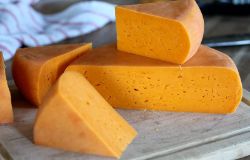Milk Nutrition facts
Milk

Milk is a nutritious liquid that occupies an important place in the promotion of health of humans, especially young children. It is consumed as a drink or employed in the preparation of other dairy products such as yogurt, cheese and in the cooking.
Milk is produced by the mammary glands of female mammals. Cow's milk is the most widely used, but water-buffalo, sheep, goat, donkey, mare, and camel milk also consumed as the principal source of 'milk-drink' in different regions. The word milk without any mention of the animal species refers to cow's milk.
Similar Food
-
 American cheese 334 Cal
American cheese 334 Cal -
 Brie 334 Cal
Brie 334 Cal -
 Cheddar 410 Cal
Cheddar 410 Cal -
 Colby 394 Cal
Colby 394 Cal -
 Cottage 84 Cal
Cottage 84 Cal
Source of Calorie
64
Calories
-
Carbs4.65 g 29%
-
Protein3.28 g 20%
-
Fat3.66 g 51%
How long to burn off 64 Calories?
*Approximate base minutes for a 25-year-old, 65 kg adult at moderate intensity.
Swimming
10
min
Jogging
9
min
Cycling
9
min
Walking
16
min
| Nutrition Principle | Nutrition Value | Percentage of RDA |
|---|---|---|
| Principle | ||
| Energy | 64 Kcal | 3% |
| Carbohydrates | 4.65 g | 3.5% |
| Protein | 3.28 g | 6% |
| Total Fat | 3.66 g | 18% |
| Cholesterol | 0 mg | 0% |
| Dietary Fiber | 0 g | 0% |
| Vitamins | ||
| Folates | 5 μg | 1% |
| Niacin | 0.084 mg | <10% |
| Pyridoxine | 0.042 mg | 3% |
| Riboflavin | 0.161 mg | 12.5% |
| Thiamin | 0.038 mg | 3% |
| Vitamin A | 138 IU | 4.5% |
| Vitamin C | 1.5 mg | 2% |
| Electrolytes | ||
| Sodium | 49 mg | 3% |
| Potassium | 151 mg | 3% |
| Minerals | ||
| Calcium | 119 mg | 12% |
| Copper | 0.010 mg | 1% |
| Iron | 0.05 mg | <1% |
| Magnesium | 13 mg | 3% |
| Manganese | 0.004 mg | <1% |
| Zinc | 0.38 mg | 3.5% |